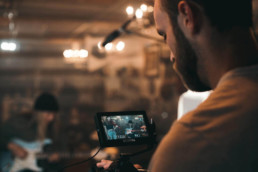ShareChat Partners with Audible Magic to Manage Licensed and Unlicensed Use of Music
Los Gatos, Calif. – Nov. 9, 2020 – ShareChat, India’s largest Indian social media platform, announced it has partnered with Audible Magic, the leading provider of rights management and automatic content recognition (ACR) solutions. ShareChat chose Audible Magic for its comprehensive reference registry containing over 40 million registered works representing global and local music from across the world. Audible Magic is considered the gold standard for content identification and will enable ShareChat to proactively address both licensed and misuses of copyright media.
“With a growing community of users and the large volume of fresh new content created every day, ensuring copyright protection is an important goal at ShareChat,” said Berges Y. Malu, ShareChat director. “With the addition of Audible Magic’s audio fingerprinting technology and their expertise in automatic content recognition solutions, we look forward to a partnership that will help us achieve our goal.”
ShareChat is a first of its kind language-focused social platform for emerging markets with more than 15 languages currently supported. With a community of more than 160 million monthly active users who generate almost 2 million content posts daily, the platform is the largest repository of Indian language content.
Every month, Audible Magic searches billions of files looking for copyright content registered by over 140,000 record labels and music publishers. Its comprehensive reference registry contains tens of millions of registered works representing music from over 150 territories, with hundreds of thousands of new tracks added each month. Search results operate on files as short as five seconds and typically complete in one second or less, with virtually zero false positives, which is key to scaling, automating, and ensuring a smooth user experience.
“We are pleased to help ShareChat proactively identify authorized and unauthorized use of copyrighted music,” said Vance Ikezoye, president and chief executive officer at Audible Magic. “ShareChat is a great example of a platform that strives to be a good partner with the music industry.”
About Audible Magic
For more than 20 years, Audible Magic has innovated solutions to identify content, manage rights, and monetize media. Audible Magic’s Emmy-winning automatic content recognition (ACR) technology powers billions of transactions monthly. The Silicon Valley pioneer is the trusted intermediary among rightsholders (including labels, studios, distributors, publishers, and collectives) and major platforms. For more information, visit https://www.audiblemagic.com/.
About ShareChat
ShareChat is a leading Indian social media platform that allows users to share their opinions, record their lives and make new friends – all within the comfort of their native language. Spearheading India’s internet revolution, ShareChat is changing the way in which the next billion users will interact on the internet. For more information, download the ShareChat app from the Google Play Store or visit https://we.sharechat.com.
Contacts:
Adriana Saldaña
Sterling Communications for Audible Magic
+1 408-395-5500
Rahul Nag
ShareChat
Novecore Delivers Lightning-Fast, Affordable Music Distribution While Protecting Artists With Audible Magic’s RightsRx™
Novecore has built its business on providing exceptional speed in music distribution at an affordable price, often uploading songs in less than a day to top music streaming services such as Spotify and Apple Music (MSS). The startup understands the challenges of fledgling musicians and offers pricing of 15% of royalties, which can change to a monthly fee of five dollars as the artist becomes established. Artists can also access an innovative online credit card and can use their royalties directly from their Novecore account.
A Business Built on Speed and Accuracy
Integral to Novecore’s business is the ability to ensure copyright compliance and maintain a preferred status with music streaming services by swiftly and accurately scanning tracks using an automatic content recognition (ACR) service before upload.
Many top music streaming services expect distributors to use ACR to scan tracks for copyrighted music prior to submission. The cost-conscious startup initially chose another ACR vendor but started to experience issues with identifications that required costly human intervention. These included:
- Files misidentified as containing copyrighted music (false positives)
- Files that the service incorrectly claimed has no copyrighted music (false negatives)
Both types of inaccuracies are bad news for music distributors and creators.
Distributors take great care to create a seamless user experience. Falsely accusing a creator of infringement creates a bad user experience, slows distribution, and undermines the credibility of the distributor.
False negatives put the distributor’s preferred status with the music streaming services at risk by allowing copyrighted material to upload.
Accuracy at an Affordable Price - RightsRx
Novecore moved to RightsRx from Audible Magic, a service known for its high accuracy and affordability. Novecore was processing tracks in less than a day without assistance from the support team at Audible Magic. The company now scans tracks against Audible Magic’s authoritative database, which includes over 140,000 labels from all over the world.
One registration to manage tracks across UGC hosting platforms
In addition, Novecore submits tracks to the Audible Magic free registry to protect their artists content on UGC hosting platforms. With one registration, Novecore can set rules for usage across many UGC hosting platforms.
“We are confident that we can take care of our artists and maintain our preferred status with digital streaming platforms because of the accuracy that RightsRx provides,” comments Matthias Merkel, Chief Operating Officer. “With Audible Magic’s registry, we can manage the appropriate use of music across major UGC platforms for our clients. The combined services help prevent inappropriate use and protect artists both before and after distribution.“
Challenge: Ensuring a clean supply chain of new artist tracks free of copyright conflicts to maintain preferred status with music streaming services.
Solution: Scanning audio tracks prior to upload to music streaming services with RightsRx and registering content with Audible Magic to manage use across multiple platforms.
Key Requirements: Accuracy, scalability, worldwide depth of the reference database.
7 Hard but Very Telling Questions for Your Automatic Content Recognition Vendor (ACR)
Consider These Issues to Avoid Costly Mistakes
Whether you are focusing on copyright compliance or licensing content for UGC, the choice of an automatic content recognition vendor may seem ancillary to your platform; the reality is that it is a crucial decision for your business. Choosing the wrong vendor can be costly and limit your ability to grow, significantly degrade your user experience, expose your service to large volumes of takedown notices, or worse.
Finding the right ACR vendor that will help you meet your compliance and licensing needs involves quite a bit of research. You may have spoken with colleagues, combed through several vendor’s websites, and possibly met with the sales representatives. Before you sign on the dotted line, there are a few key and often over-looked questions that will drive your decision.
1. Does the ACR vendor have a customer list? Are they the vendor of choice for the top platforms in the world?
Audible Magic’s customer list is a who’s who of the UGC sites both in social media and music distribution, including such services as Facebook, Instagram, Twitch, Vimeo, CD Baby, SoundCloud, The Orchard and Dailymotion, and many, many others.
Rightsholders recognize this and work with us to manage the appropriate use of their content. The list of rightsholders who proactively register with Audible Magic consists of over 140,000 music labels and over 1000 video suppliers across the globe. Our registry includes content from industry leaders such as Universal Music Group, Sony Music Entertainment, Sony Pictures, CBS/Showtime, Disney, NBC Universal, Warner Music Group, FOX, RTL Group, Grupo, and Canal+.
2. How does your vendor mainly acquire their customers?
Audible Magic is proud and humbled that we have built a business on unsolicited references from rightsholders and platforms. We continue to earn this praise through continued technical innovation and proven performance over many years.
3. Are you interested in a transactional relationship, or are you looking for a trusted advisor that is experienced and understands the latest regulatory changes?
At Audible Magic, we bring 20 years of experience with all types of business models. We have long-term relationships with key players in the industry and understand the challenges of compliance and licensing. We have top players on our team from the industry with extensive knowledge of rights management as well as an understanding of automatic content identification. With each identification, we understand that we are helping you make decisions that will impact your business.
Although you may think you are only buying a transactional service with Audible Magic, you are gaining access to a team with in-depth industry knowledge that can guide you through issues such as the recent changes in the EU Copyright Directive (aka, Article 17).
4. Will you have access to a support team or a bot?
Audible Magic has an experienced team of customer support analysts here to support you via phone or email 24/7 if needed.
5. Do you want a vendor that has been working to build a trusted bridge between platforms and rightsholders, or do you want a vendor that has been servicing only rightsholders?
Audible Magic has been building a trusted bridge between the rightsholders and the platforms by providing services that bring clarity to the use of audio and video. Other vendors come from a very combative history in the industry. As a platform, what kind of vendor do you want to hire? At Audible Magic, you are our customer, and because of our position in the industry, we provide a balanced bridge between rightsholders and UGC services.
6. Does the solution sound too general-purpose or feel too slick? It probably is.
We deal with many types of platforms with different business models and have found that a one-size-fits-all solution, well, doesn’t get the job done. We work with our customers to provide the best result for their specific needs, resulting in extremely high accuracy rates and at extremely high volumes (hundreds of millions of transactions per day).
The ability to provide highly accurate identifications allows your business to grow without human intervention, constantly reviewing misidentified files. You’ll want a service that minimizes the impact on user experience. Imagine telling a user that the file he just uploaded includes unauthorized copyrighted material, and it actually doesn’t. That happens with solutions with other vendors and is extremely rare with Audible Magic’s technology.
When it comes to licensing, some customers need to administer directly licensed deals, while others need sub-licenses. Your ACR vendor should be flexible enough to meet your needs for compliance, licensing, and reporting.
7. New is not necessarily better. Do you want to entrust the future of your business to unproven technology or business acumen?
Audible Magic has assembled an innovative and experienced team that has kept pace with the latest developments in the industry, whether it is short clip length or creating a solution to identify covers. Our ever-growing list of patents (51 and counting) shows we mean business when it comes to innovation. Twenty years doesn’t mean staid. It means we have successfully, over the last two decades, met the challenges our customers continuously bring us.
Twitch is Working on a Way to Delete all Clips More Easily
Over the last week, numerous Twitch streamers have been hit with DMCA takedown notices for copyrighted music, with some being targeted for years-old clips. In response, Twitch said it is creating the ability for streamers to delete all of their clips more easily as a way to avoid getting a copyright strike. The platform also said it will use Audible Magic a long time provider of automatic content recognition (ACR) services to Twitch to scan existing clips with copyrighted music and delete those without penalizing the streamer.
Read more here.
Audible Magic Monetizes Music On User Generated Content
Automatic content recognition (ACR) solutions provider Audible Magic has launched its UGC Music Rights Platform (UMRP), which simplifies the licensing and administration of music rights for user-generated content on social media.
Read more here.
Indiefy, an Indie Record Label & Distributor Platform, Supports Emerging Artists While Verifying Copyright Ownership

From its launch in 2016 in Guadalajara, Mexico as a music distribution service and label, Indiefy understood the importance of providing aspiring indie artists an excellent user experience while seamlessly uploading tracks free of copyright claims to digital service providers (DSPs). Striking the balance of servicing its subscribers and ensuring smooth operations, including copyright compliance, Indiefy not only built relationships with artists around the world but also maintained the platform’s status with DSPs.
Indiefy regards automatic content recognition technology as crucial to ensure the integrity of their supply chain and catalog, and to preserve their status as a trusted supplier to the leading music DSPs. Early on, Indiefy had chosen a vendor whose service was not as accurate as they needed and was forced to manually review any identified files from the vendor. They found the vendor’s service:
- Misidentified files as containing copyrighted music when they actually did not (aka false positives), falsely accusing an artist of misappropriation.
- Correctly identified files with copyrighted music but referencing the wrong metadata.
With a strong commitment to delivering reliable and affordable service, Indiefy wanted to avoid providing inaccurate data, falsely accusing an artist of copyright infringement and holding up his or her music from uploading to DSPs. The team knew the overhead of manually reviewing files could not be sustained and began looking for another automated content recognition solution (ACR).
RightsRx™– The Highest Accuracy for Any Budget
After reaching out to Audible Magic, the Indiefy team was pleasantly surprised at the various affordable service options for RightsRx, built using Audible Magic’s content identification technology – known for its accurate identification rates and virtually zero false positives. The development team also found it easy to install and use, speeding the time-to-market for deployment into production.
RightsRx compares tracks to music from more than 140,000 music labels from over 150 different territories in Audible Magic’s authoritative database and responds in seconds with a match or no match. If there is a match, it will display the conflicting rightsholder.
“The accuracy and the lack of human intervention not only builds our reputation for professionalism with indie artists, but also with DSPs that expect a clean catalog from Indiefy,” comments Gilberto Avalos, Founder and CEO at Indiefy. “The fire and forget aspect of RightsRx allows the team at Indiefy to focus on developing our platform and building artists’ careers.”
Challenge: Ensuring a clean supply chain of new artist tracks free of copyrighted content conflicts.
Solution: Scanning audio tracks before uploading to DSPs with RightsRx.
Key Requirements: Accuracy, scalability, and ease of use.
Audible Magic Review: An Article on Live Streaming and the New European Copyright Directive
Whether you agree with the new European Copyright Directive or not, an objective of the Directive was to ‘clarify’ the definition and obligations of online content sharing service providers (“OCSSP”). One area which remains unclear, however, is the application of the Directive to ‘live streaming’ platforms – which in these times are becoming an increasingly significant category of media.
A new article by one of Europe’s leading copyright law experts, Dr. Eleonora Rosatii, examines live streaming services in the context of existing EU copyright law and the new 2019 EU Directive on Copyright.
Conclusion: Live Streaming Platforms Classified as OCSSPs
Dr. Rosati’s analysis concludes that live streaming platforms fall within the definition of an ‘online content sharing service provider’ under the new 2019 EU Directive on Copyright in the Digital Single Market (The Copyright Directive). These platforms can, therefore, be held directly liable for copyright infringement by making infringing streams, initiated by their users, available to the public.
In this respect, the Copyright Directive does not materially alter their position as it stood under EU law prior to the Directive being passed. What is different, is Article 17 provides live streaming platforms protection from liability, if they make best efforts to get licenses and take measures according to high industry standards to ensure the non-availability of infringing content via their platform.
Summary of Analysis
Given the huge spike in live streams of DJ sets during the COVID-19 pandemic, this timely article looks at live-streamed performances and notes that, if the performance had taken place in a public venue, the venue would have been required to obtain copyright licenses.
Dr. Rosati examines the situation of a hypothetical Platform X: DJs upload live streams of their performances which include the playing of copyright sound recordings. Platform X stores the material only for so long as necessary to enable the uploads to be transcoded and then streamed to an audience of frustrated would-be club-goers. Storage is therefore ephemeral, and no copies of the DJ sets are stored for future on-demand streams or downloads. The live streams are indexed by the platform, enabling would-be listeners to search and find streams or DJs they like.
The author explores the platform’s direct liability under the principles of existing EU law for making user-generated content available to the public. These principles were developed in successive cases decided by The Court of Justice of the European Union, culminating in the express finding of direct liability in the 2017 decision in Ziggo (the Pirate Bay case)(C-610/15). The precise nature and scope of this liability remains uncertain as evidenced by the number of CJEU referrals currently pending in this area (YouTube, C-682/18; Elsevier (C-683/18); Stichting Brein (C-442/19); and Puls 4 TV (C-500/19)).
Dr. Rosati says that it is not surprising that the Copyright Directive is characterized (in Recital 64) as a ‘clarification’ of existing law. She points out that where Article 17 goes beyond the pre-2019 EU copyright regime, it is not in the direct liability of OCSSPs for acts of communication or making available to the public, but in the regime that it establishes around that potential liability.
The article also examines whether a live streaming service can be considered an Online Content-Sharing Service Provider (OCSSP). Article 2(6) of The Copyright Directive defines an OCSSP as an online service, one of whose main purposes is “to store and give the public access” to large amounts of copyright content which it “organizes and promotes for profit-making purposes.” The issue is whether the ephemeral nature of the storage disqualifies the live streaming platform from being classified as an OCSSP. Rosati examines this question in-depth in the context of the Copyright Directive and the E-Commerce Directive and concludes:
“Live streaming providers that behave like Streaming Platform X in the example above are to be regarded as OCSSPs, even if the storage made of user-uploaded content is limited in time. What is relevant for the qualification of a provider as an OCSSP in principle is the purpose that it pursues (to store and give the public access to a large amount of protected subject matter uploaded by users) and, with that, the role that it performs (organization and promotion of such subject matter for profit-making purposes), not the duration (e.g., permanent or temporary storage of protected content) of the activity at hand.”
Dr Rosati concludes that the activities of the live streaming platforms are therefore governed by Article 17(4) of the Copyright Directive, and because of that, OCSSPs can protect themselves from liability, if they make efforts to obtain licenses for the content, and in the absence of any license, use best efforts, according to high industry standards, to prevent the availability of unlicensed content contained in the live streams. In conclusion, if live streaming platforms are classified as OCSSPs, the new Copyright Directive provides them a new ‘safe-harbour’ from liability provided they meet their other Article 17 obligations.
Commentary: Platforms Benefit from Safe Harbour as 2019 Copyright Directive OCSSP
The relevance of this article to live streaming platforms is clear and the implications are significant. Any live streaming service that gives public access to large amounts of copyright content uploaded by users, which it organizes and promotes for profit-making purposes, can be held directly liable for copyright infringement. This applies to both pre- and post- 2019 EU Copyright Directive regimes.
Prior to the Directive, even if a live streaming platform tried to get licenses and employed content recognition technologies to prevent unlicensed uploads, the platform would be liable for any infringing content that managed to get uploaded to its platform.
The new Copyright Directive changes that: The platform can now protect itself from direct liability by taking the steps prescribed in Article 17(4). These include using best efforts, according to high industry standards, to ensure the non-availability of content, in respect of which the copyright owner has provided relevant and necessary information.
_______________________________________________________________________________________________
[i] Associate Professor in Intellectual Property (IP) Law at Stockholm University; Guest Professor at CEIPI-Université de Strasbourg; Research Associate and Lecturer at EDHEC Business School; Associate at the Centre for Intellectual Property and Information Law at the University of Cambridge; Of Counsel at Bird & Bird; and Editor of the Journal of Intellectual Property Law & Practice (Oxford University Press, peer-reviewed). Dr. Rosati holds law degrees from the University of Florence, an LLM from the University of Cambridge, and PhD from the European University Institute.
Audible Magic Corporation Review is issued for informational purposes only and is not intended to be construed or used as general legal advice. Please contact the author(s) or your Audible Magic Corporation contact if you have questions regarding the currency of this information.
For more than 20 years, Audible Magic has innovated solutions to identify content, manage rights, and monetize media. Audible Magic’s Emmy-winning automatic content recognition (ACR) technology powers billions of transactions monthly. The Silicon Valley pioneer is the trusted intermediary among rights holders (including labels, studios, distributors, publishers, and collectives) and major platforms.
Audible Magic is a service mark and trade name of Audible Magic Corporation ©2020 Audible Magic Corporation. All rights reserved.
Plan Now
It is important to start planning now on how to meet the requirements and understand the impact of the Directive on your business.
Below are some resources to help you understand the Directive and how it may impact your business.
- Take our A17 Assessment Survey for platforms to assess if the Directive affects your company and then assess your readiness to comply
- Understand how small social networks will be impacted
- Read the full text of the Directive
- And more is available on our Article 17 page as well as in our blog section
Audible Magic Continues to Support Customers During the COVID-19 Outbreak
The health and safety of our community, customers, partners, and employees are our top priority. As of Monday, March 16th, all of our employees in both the Los Gatos and London offices are working remotely — we have suspended all non-essential work-related travel. We are continuing to monitor recommendations from the CDC and the World Health Organization to remain up-to-date on the latest information and safety protocols.
We anticipate no disruption to our service during this time. All our teams will remain fully operational and will continue to provide the highest quality service and support to our customers and partners.
As always, you can contact Audible Magic support by emailing [email protected] or submitting a ticket on our support page: https://support.audiblemagic.com/hc/en-us.
Stay safe, and together we will get through this challenging time.
Vance
President and CEO
Audible Magic
AM's CEO Vance Ikezoye Talks About Current Practices at the EU Copyright Stakeholder Meeting
December 16, 2019
Introduction
My name is Vance Ikezoye. I am co-founder and CEO of Audible Magic. With me is Mike Edwards, General Manager and Vice President for the EMEA region. We would like to thank the Commission for this opportunity to speak.
For the purposes of this presentation, we would like permission to use the term “Platform” to represent the Online Content-Sharing Service Providers (OCSSP).
Audible Magic is a technology company that was founded in 1999. Over the past decade, we have been one of the leading providers of copyright identification services to these platforms.
Business Roles and Policies
I would like to share an overview of how we work with Platforms and the Content Industry. Our customer, the party that pays for our services, are the Platforms. The Rightsholders have and must take affirmative action to register their repertoire into our systems. We do not charge Rightsholders for works registration.
Usage and match data are confidential information of the Platform. Any release of that information requires explicit approval by the Platforms. However, our current agreements generally allow us to provide limited information to Rightsholders about the services used by each Platform.
Since the Platforms pay, they have discretion as to what services they use and what content they process.
This arrangement has been working well in practice for over a decade. We believe that most of our customers and rightsholders act in good faith and are trying to do the right thing for all involved, including the consumer.
The Technology
Our service uses a fingerprinting technology which we have developed and continue to enhance. A fingerprinting technology matches content based upon perceptual characteristics of the content itself. It doesn’t rely on metadata or embedded marks. The technology can differentiate between live and studio versions of the same song. We provide services for identifying music and film/video content.
Audible Magic’s scientists were among the early pioneers of audio fingerprinting and obtained many of the first patents in the field. We continue to invest and enhance the technology to keep up with the rapid changes in digital media. We have also been granted an extensive portfolio of patents which provides our customers peace of mind from any threat of litigation for patent infringement. Uniquely, we indemnify our customers against any claims for patent infringement arising from the use of our technology.
Works Registration
We have over 140,000 rightsholders’ content registered in our program across music and film/video. We receive on average 300,000 new works per month. This content comes from over 140 countries. We have a range of rightsholders from major record labels and Hollywood studios with millions of works, to independent singer/songwriters with five tracks. There are no restrictions. Any bona fide copyright owner may register their works with Audible Magic. Most of these registrations are provided to us prior to commercial release or broadcast.
The Registration Process is very straightforward. Rightsholders contact AM; many times they are referred to us by our platform customers. They first sign a simple 2-page registration agreement. We do not charge rightsholders for registration of their works.
Rightsholders then either provide digital or physical copies of their works or we provide them tools to fingerprint the content themselves. They provide us basic information about each copyrighted work, including song titles, artist names, record labels, show titles, season and episode numbers. In addition, for each title, they supply us their designated business rule, such as allow, block, or monetize. We can also support duration-based rules, which for example can enable content under a specified duration to be allowed.
We can manage these rules by Platform. Thus, the same work could be blocked at one platform and allowed for use on another. We ingest the fingerprints, metadata, and business rules into our services. This metadata provides the basis for the information communicated to the Platform when a match occurs. This information is then ingested into our identification system.
Many right holders use third party service providers to register their content with Audible Magic and with other service providers. We strongly support moves by organizations such as ALPA to set up a one-stop-shops to enable their members to effortlessly register with multiple content recognition services including Audible Magic, Facebook, YouTube ContentID and INA.
The Identification Service for Platforms
We work with Platforms to implement our service. Platforms deploy a simple piece of software at the point of ingest after upload by the consumer. This integration is very easy, and the programming required is measured in minutes or hours (at most). This software processes the unknown media and generates the data needed to identify the work. This data is sent to our services via the internet. There is no information about the consumer that is used or transmitted to us. Each identification request is processed in less than a second and the service returns the metadata and business rules associated with the matched work back to the Platform.
There are various configurations of the identification technology which are optimized for each platform and their specific use case. We try to balance the thoroughness of the analysis against the cost of the service. In general, the current technology standards that our customers utilize is the unknown content contains 20 contiguous seconds matched to the registered copyrighted content for longer form content, and 5-10 contiguous seconds for short form content.
Every month we process over 3-billion identification requests per month from our customers. At peak, we can process over 8,000 requests per second. These volumes demonstrate the scale of user generated content on social video platforms.
With regards to Staydown capabilities, we have been providing that service since 2008, however most of our Customers have not implemented this feature.
Our customers are diverse. Platforms take the form of websites and mobile applications. Our customers range from some of the largest platforms in the world to small platforms in Africa and Southeast Asia. We have platforms that handle hundreds of files a month and platforms that do thousands per second.
The customers range in technical capabilities. We have small platforms with the CEO acting as the software programmer to major platforms with teams of engineers and lawyers. We have platforms that utilize the ad-support monetization model and those that are subscription-based. As a general rule, most of our platforms do not broadly monetize their UGC videos.
Legitimate Technical Issues
In the course of these Commission Dialogue meetings, there have been a number of issues discussed by the various Stakeholders. Many of these issues are legitimate and worthy of continued discussion. We’d like to briefly comment on some of them:
False Positives and Over-Blocking
The use of an identification technology is the only practical method of dealing with the volume of user content being generated. Since this is an automated process, accuracy is perhaps one of the most important requirements for an identification technology. All technologies are not alike. My co-founder used to say that it is very easy to invent a bad technology. And the reality is that technologies can be optimized for one attribute at the expense of others.
We believe that incorrectly identifying a work, a false positive, is a critical error and therefore ensuring misidentifications are essentially zero is the single most important objective for a production technology. We believe false identifications lead to over-blocking, attributing rights to the wrong content, or platforms having to manually review results.
One example of where false positive problems can occur is with measuring too short a duration of content. Trying to use fingerprinting technology to match one or two seconds of audio is like trying to match two compositions based upon two musical notes.
Copyright Exceptions
Copyright exceptions require a high degree of intellectual judgement and an understanding and appreciation of context. We do not represent that any technology can solve this problem in an automated fashion. Ultimately, these types of determinations must be handled by human judgement. However, identification technologies can supply data which can be used to enable more informed copyright exception analysis.
We fully support the call by many of the organizations representing consumer rights for transparent, accessible, and speedy appeal processes, administered by humans as the optimum way of addressing the issue. We also want to recognize that several of our customers have described in their presentations during these proceedings their redress mechanisms. It is probably because of these redress mechanisms that, in the more than 12 years we have been providing content recognition services to some of the world’s largest platforms, that we have not become aware of any serious or systematic issues in this area.
High Industry Standards
There has been much discussion with respect to the High Industry Standards language of the Directive. We believe that a copyright identification service which meets this bar must have at least the following attributes: First, service must be representative of global content. The service must be accessible and supported by a critical mass of rightholders, who have affirmatively registered their content. And it must be a turnkey and affordable solution for the range of platforms. We believe there are a number of commercially available content recognition services for the music and film/video industries that meet these criteria. Although this is a difficult issue, the drafting of the Directive was very thoughtful with respect to the recognition of the ongoing evolution in media and continuing improvement of technology to identify it.
Complexity of Licensing Administration
The clear intention of the Commission with the Directive is to encourage licensing of content by the Platforms. The reality is that there are complexities related to both the licensing of content as well as the administration of the licenses and royalties. These complexities cause issues of time and expense for both platforms and the rightsholders. The problem logistically is how to manage the sheer number of rightsholders and size of catalogs that exist globally. And an added comment, roughly 90% of the titles registered with us never get identified, even once out of the 3 billion identifications we perform every month, across our platform customers.
Red Herrings
On the other side of these proceedings, there are some issues that continue to be raised as concerns related to the use of identification technologies. These concerns I would characterize as “Red Herrings”.
Cost of the Service
The first Red Herring I would like to mention is the cost of the service. Our service fees are based upon the number of files processed. So smaller platforms with fewer files, pay less than large platforms. We have customers that pay a few hundred Euros per month. In addition, there is an active and competitive market for content identification services, and there is no need for any platform to make the capital investment to develop their own technology. Some of the biggest and smallest platforms in the market are customers of ours.
Cost and Difficulty of Implementation
Another frequently heard Red Herring is the issue that the technical implementation of identification services is time consuming and difficult. We have had customers implement our technology in minutes based only upon our documentation. We also make available technical support to our customers, to help them implement our solutions.
Technology Maturity
We believe that the technology for identification is mature and presents a viable solution to all sizes and types of Platforms. We believe this because our customers prove it. Our services have been used by scores of platforms reliably and non-controversially for over a decade.
Future Directions
With that said, there are areas the tech industry can help both platforms and rightsholders in implementing both the letter and intention of the new Directive. One of the biggest areas, which we cited previously as an issue, is in licensing and royalty administration.
We believe that the content licensing effort for both the platforms and rightsholders is very complex and time consuming. Because platforms are global and rights are by territory, licensing for a platform is a non-trivial exercise.
Secondly, once licenses have been obtained, the effort to administer and report on usage and royalties is very difficult for the platforms. And on the other side, the rightsholders have an equally challenging and difficult time processing and understanding the reports provided by the platforms.
We think this is an area where the technology vendors, such as Audible Magic, can provide further value to supporting the goals of the Commission with Article 17 – which is to enable a more frictionless environment for licensing and use of copyrighted content by consumers and platforms.
I can report that we are collaborating with many music right holders and platforms to develop simple, one-stop licensing processes, and to develop the tools for license management and administration that will remove the need for individual platforms to invest in building these systems themselves. We will be making further announcements in this regard as these systems are launched.
Thank you.
For more information on the fourth meeting of the stakeholder dialogue, you can visit the following page.
Plan Now
It is important to start planning now on how to meet the requirements and understand the impact of the Directive on your business.
Below are some resources to help you understand the Directive and how it may impact your business.
- Take our A17 Assessment Survey for platforms to assess if the Directive affects your company and then assess your readiness to comply
- Learn more about the impact of the EU Copyright Directive on live streaming platforms
- Understand how small social networks will be impacted
- Read the full text of the Directive
- And more is available on our Article 17 page as well as in our blog section
Audible Magic Delivers Expanded Content Identification for Short-Form Video
Los Gatos, Calif. (Nov. 13, 2019) – Audible Magic, the leading provider of content identification solutions, announced it has expanded its services to provide copyright compliance and monetization for short form video found on social networks. The expanded service is available immediately. With the explosive growth and popularity of short-form videos, typically 15 seconds or less, there is a need to automatically identify copyrighted content of very short duration.
This capability supplements the company’s industry leading service for long form video, which has been adopted by the social media platforms. The service adheres to the same high standards with exceptional identification rates and virtually zero errors. With the 24/7 nature of social media, the service operates at scale with sub-second response times. As a turnkey solution, the service is easily integrated and is cost-effective for a range of companies – from large global platforms to small startups; and websites to mobile apps.
The new service is integrated into the company’s recently announced UGC Music Rights Platform (UMRP), which provides a comprehensive program to facilitate the licensing and monetization of music on social media platforms.
“We’re laser focused on providing copyright solutions for user-generated content on social media platforms,” said Vance Ikezoye, president and chief executive officer of Audible Magic. “This expanded solution uses our robust technology to support the compliance and licensing of content used in short user clips, which is a significant growth area for our customers.”
About Audible Magic
For more than 20 years, Audible Magic has innovated solutions to identify content, manage rights, and monetize media. Audible Magic’s Emmy-winning automatic content recognition (ACR) technology powers billions of transactions monthly. The Silicon Valley pioneer is the trusted intermediary among rightsholders (including labels, studios, distributors, publishers, and collectives) and major platforms.
Contact
Adriana Saldaña
Sterling Communications
[email protected]
+1 408-395-5500
###











